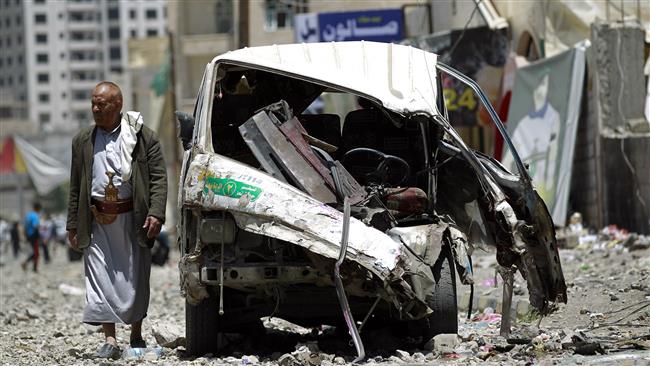Alwaght-Saudi regime executed its
military aggression against Yemen on March 26 - without a UN mandate - in a bid
to restore power to fugitive former president Abd Rabbuh Mansur Hadi, who is a
close ally of Riyadh. Nearly a month later the Saudi monarchy spokesman
Brigadier General Ahmed al-Assiri, in a broadcast late on Tuesday, announced
the termination of Riyadh’s raids, codenamed as the so-called Decisive Storm against
Yemen. Today, former Yemeni president still resides outside his country in
Riyadh, leaving the Saudis with no tangible achievement of any of its
previously set goals.
As a result of a fair evaluation
of the so-called Decisive Storm against Yemen it could be easily said that the
announcement of the termination of the Saudi raids is a clear denotation of the
defeat of Al-Saud in their offensive.
When a side declares war it must
have had preset goals in its strategic plan, and according to how much it had
achieved, the postwar evaluation is conducted. The Saudis declared their war on
Yemen by stating only one goal, which was to restore power to their former
puppet president Mansur Hadi, but the reality behind this claimed goal was
their extreme fear from an independent resistance power growing besides its
border under the name of Ansarullah.
The Saudis called out their
termination of this aggression with not only no accomplished goal but also with
extra strategic losses. The first loss appeared when the Saudis realized they
do not have reliable allies, with the withdrawal of Turkey, opposition of
Pakistan, and the evasion of Egypt during the first moments of the war. Later
on, also Qatar pulled back and Emirates disputed with the Saudi regime over the
way of leading the war. This war has even displayed the fragility of Al-Saud
household, where many princes among them either objected the aggression or were
totally absent from the war scene.
Not to forget that also the
Saudis could not even kill one Ansarullah leader or commander, or destroy any
military base, camp, or depot; where the infantry and the armory of Ansarullah
are still in their good state.
Also, the Saudi army failed to
execute a ground attack, due to the betrayal of its supposed allies, and the
weakness and inexperience of their soldiers.
This
failed attack has just resulted, firstly, in the death of around three thousands
Yemeni people, including women and children, who were martyred and thousands who
were wounded and displaced. Secondly, some of the Yemeni’s infrastructure was
ruined; and thirdly, Ansarullah revolutionary forces together with the Yemeni
army took control of several provinces in Yemen.
Now,
as some analysts say, the Saudis should be asked, which of the three points was
among the objectives of the ‘Decisive Storm?
The Saudis definitely wanted the
opposite, because all those civilian casualties will never be a strategic
victory to come in count rather than actually being a cause of hatred towards
them from the Yemeni, Arab, and Muslim people; and also a cause for bringing
the world public opinion against them.
Apparently the civilian
casualties are an enough proof for condemning the Saudi regime by the
international criminal court if it wants to judge the war results fairly,
specially that there are reports stating that the Saudi has used some
internationally prohibited bombs in their aggression on the innocent Yemeni
people.
The Saudi has decided to execute
this military aggression when they felt they had no other option on their
table, and now by the failure of their last action, nothing remains in front of
Al-Saud but to sit and negotiate with Ansarullah as a legitimate political
power in their neighboring country. It is also obvious that what Al-Saud could
not achieve from their goals in war, will not be achieved by politics. Not to
forget Ansarullah has the right to reply in whatever means it sees appropriate
in order to teach the Saudi regime a lesson that will prevent it from doing
such an idiotic mistake in the future with Yemen or any other Muslim country.



























